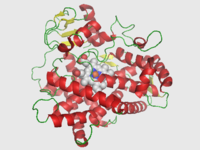
Photo from wikipedia
Despite their widespread popularity as sport and companion animals and published and anecdotal reports of vast difference in drug disposition and pharmacokinetics between individuals, studies describing equine drug metabolism are… Click to show full abstract
Despite their widespread popularity as sport and companion animals and published and anecdotal reports of vast difference in drug disposition and pharmacokinetics between individuals, studies describing equine drug metabolism are limited. It has been theorized that similar to humans, members of the CYP2D family in horses may be polymorphic in nature leading to differences in metabolism of substrates. This study aims to build on the limited current knowledge regarding P450 mediated metabolism in horses by describing the metabolism of the polymorphic CYP2D6 probe drug codeine in vitro. Codeine, at varying substrate concentrations, was incubated with equine liver microsomes (± UDPGA) and a panel of baculovirus expressed recombinant equine P450s. Parent drug and metabolite concentrations were determined using LC-MS/MS. Incubation of codeine in equine liver microsomes generated norcodeine, morphine, codeine glucuronide and morphine 3- and 6- glucuronide. In recombinant P450 assays, the newly described CYP2D82 was responsible for catalyzing the biotransformation of codeine to morphine (Km of 247.4 μM and a Vmax of 1.6 pmol/min/pmol P450). CYP2D82 is 80% homologous to the highly polymorphic CYP2D6 enzyme, which is responsible for biotransformation of codeine to morphine in humans. CYP3A95, which shares 79% sequence homology with human CYP3A4 and CYP2D50 catalyzed the conversion of codeine to norcodeine (Km of 104.1 and 526.9 μM, Vmax of 2.8 and 2.6 pmol/min/pmol P450). In addition to describing the P450 mediated metabolism of codeine, the current study offers a candidate probe drug that could be used in vivo to study the functional implications of polymorphisms in the CYP2D gene in horses.
Journal Title: Biochemical pharmacology
Year Published: 2019
Link to full text (if available)
Share on Social Media: Sign Up to like & get
recommendations!